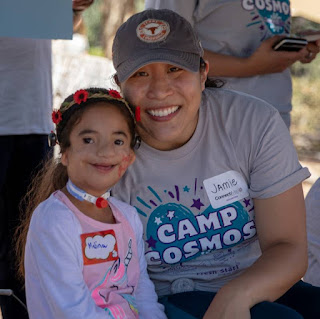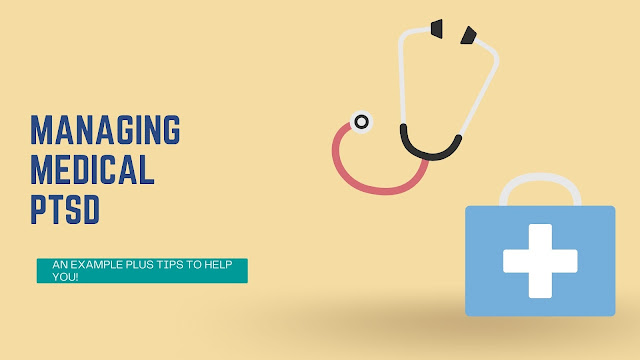Many thanks to ConnectMed for creating these opportunities for families in Southern California and beyond!
Thursday, January 27, 2022
Camp Cosmos Online Event Set For Saturday, February 26th
Thursday, January 6, 2022
Medical PTSD, and A Few Ways To Manage It
By Kara Jackman
Episodes of medical PTSD can hit anyone at any time. We carry all this trauma around with us every day like an invisible backpack on our shoulders. It isn't until a triggering event occurs that we realize that backpack even exists. I know many in our CCA community experience these triggers on a daily basis, so I hope through a brief personal story that I can help you manage the anxieties, sadness, and other emotional pain caused by trauma in constructive ways.
A Medical PTSD Triggering Event
A few months ago I had a sinus infection that necessitated some medical treatment. Antibiotics were in order, I had waited long enough. Thanks to COVID-19 and working at a University, I was required to go see my primary care for this particular doctor's visit. The appointment began pretty normally, lots of questions, I croaked out answers as the pain reverberated around my throat and vocal cords. Then, the physicians' assistant took the typical look in the throat a bit too far. She looked at my throat for over 20 minutes requiring me to open my mouth multiple times for long durations. My arthritic jaw was in acute pain, eyes were tearing up, and the tongue depressor got wet and gross. My gag reflex joined the party I was involuntarily invited to. I asked twice for her to get a new tongue depressor, but she only flipped it over. Then, finally, I gathered the courage to ask a third time. She obliged, but not before my gag reflex went off a few more times.
What was taking so long? Why was she looking at my throat like it held hidden secrets of some grand Egyptian temple? She gazed and gawked for nearly half the appointment time. Whether the throat was infected or not, the end result was going to be the same thing, oral antibiotics, and maybe if I was lucky some steroids for the pain.
And now the questions, "where are your tonsils?" she asked.
"I don't know they probably got taken out, or never existed in the first place. Why?" I responded.
Breezily, she said, "I don't know. I was just wondering."
I endured and persevered this long examination the entire time wondering if I needed surgery or if something was seriously wrong with my throat. Maybe I had really done some damage, or maybe this sinus infection was not a sinus infection at all. While I continued to worry and muse, she finally finished.
It took all my courage to ask her again, as tears streamed down my face, “why were you looking at my throat for so long?
She said, "I wanted to take a good look."
I asked, "Are you curious about my anatomy?"
She said "No, i just wanted to make sure everything was clear."
False. That was a lie. Just saying...but it had to be said.
Finally, I capped off our conversation by informing her that when anyone examined me for that long it meant surgery. I cried some more, figuring it was a better emotional road than the fury that sat in my chest.
She said she was glad she told me that information. She was receptive and nimble enough to say she was grateful for how my past history informed this moment.
After A Triggering Event
Days later, I was still hurting, sad, angry, upset. The event circulated around my head for a while after it happened. Each time I thought about it, though, I congratulated myself on how I handled it. The idea is to advocate for yourself, informing the caretaker or medical professional about the way you feel in the moment. This could positively affect how they manage future patient interactions, and future appointments with you.
De-Stress and Process
Also, in the days that follow this kind of incident, create time and space to process the emotions and thoughts you are dealing with. This part is hard, and for me involves some serious self care, yoga, exercise, taking a bath, painting my nails, reading and journaling, while cognitively restructuring my thoughts about the event. Negative or retriggering thoughts ("I'm so scared." "Maybe there really is something wrong with my throat.") lead to increased anxiety and sadness. It is vital to distract yourself with fun things while you do the hard work of accentuating the positive thoughts and experiences from the triggering scenario. Though this is time consuming, and sometimes hard, cognitive restructuring and distress tolerance always help keep my emotional pain at bay.
Talk To Someone
 |
| Image Credit: IStock |
In addition to the internal work described above, you may want to talk to someone you trust about the triggering event and the past traumas you have endured. Be willing to accept help from people like trusted friends, therapists, parents, priest, pastors, or whomever you deem trustworthy. People in our CCA community are a perfect example of a group of people you can trust because they have walked a similar path. Be open to help from others. If someone says, "no" or they seem disinterested, move on to the next person.
Inform
Finally, inform the medical provider about your medical trauma or anxiety. Don’t ever be afraid to show your true emotions to medical staff. If the feelings are too intense in the moment, you may have to go back later to have that conservation. Doctors' offices and hospitals often send out surveys after appointments. Take them! The feedback, positive or negative, could help the next person, or it could begin a dialogue that could improve your medical care. Another avenue would be contact the hospital or medical center's patient relations department. Doctors, physician's assistants, and other medical professionals are all in helping professions. They need the feedback to improve the ways in which they can help.Finally, trauma rewires the brain. I believe the psychological and mental burden is the hardest part of the craniofacial life. Your mental health and emotional reactions to people, places, and events in your environment can all be triggers. Be ready with your distress tolerance skills to keep you calm. Breathe! Breathe deeply from the abdomen engaging the diaphragm, and imagine breathing out the pain down into your legs and out the soles of your feet. Be patient you can get through it!
Yes, it's unfortunate that sharing this with the people that care for us is our job. This part of our lives is truly exhausting. But the more we talk about it with the people that treat us and care for us, the closer we will get to trauma-informed care. Education and awareness raising is the only way — and sadly we and our allies are the only teachers!
Tuesday, January 4, 2022
College Scholarships Available For New England Area High School and College Students
As it says in the image above, "these awards recognize promising students born with a facial difference that reside in New England. Award recipients are selected based on academic performance, extracurricular activities, and community service. These scholarships are named to honor extraordinary people who have made their mark not only within FFC, but throughout the craniofacial community.
Saturday, January 1, 2022
Moebius Syndrome Awareness Day is January 24th! Learn More Inside!
Press Release – Moebius Syndrome Awareness Day 2022
The Many Faces Of Moebius Syndrome (www.mfoms.org), the Moebius Syndrome Foundation (www.moebiussyndrome.org), the Children’s Craniofacial Association (www.ccakids.com), and Face Equality International (www.faceequalityinternational.org), are UNITED in announcing the 11th annual Moebius Syndrome Awareness Day which will be celebrated worldwide on Monday the 24th of January, 2022.
This event will occur in real-time -shared online- as people around the world hold a wide variety of special events in multiple locations to recognize the UNITY of understanding and hope that has brought us all together.
While the medical aspects of Moebius syndrome are quite rare, the human aspects of living with a facial difference are ones that can UNITE us all. When we see beyond each other’s visible differences – (for those of us with Moebius syndrome - of facial paralysis, speech differences, or any of several other related symptoms) – to the souls within, we begin to see and honor one another in their humanity. Join us in honoring the journeys many among us have taken – from the numbing isolation of being “the only one” to now being part of an ever-expanding world-wide community that takes pride in its’ identity!
We are UNITED in recognizing both the progress we have made as well as the hopes we embrace for our future. Many of us went years – decades – a lifetime - before even knowing that others shared the same facial paralysis and painful, isolating experiences of stares and rejection. We are grateful for the work of scholars like Frances Cooke MacGregor, who is recognized as the first to write about the unacknowledged, yet major stresses of people who suffer facial disfigurement through birth, accident, disease, or war. Because MacGregor spoke out, ‘awareness’ of experiences such as ours could begin. We are grateful that MacGregor’s work led to a growing self-help network which recognized facial differences as well as media coverage (in the early 1980’s!) that spoke respectfully of life with Moebius syndrome and other differences.
While this special day is held annually on the birthdate of Professor Paul Julius Moebius (who first described this syndrome in medical literature), we foremost recognize his efforts that led to a name (Moebius syndrome) – one that brought us all out of isolated anonymity into a network of understanding and support.
From the Many Faces of Moebius Syndrome –
“Since our inception, the Many Faces of Moebius Syndrome (MFOMS) has moved forward with passionate diligence to unite our global community and the other organizations who serve it through our websites, social media pages, and in person events. Only in unity can we satisfy all the needs of our community and build a better tomorrow for those of us living with Moebius Syndrome and our families. We are proud to serve alongside these three great organizations in promoting Moebius Syndrome Awareness. Together the possibilities are endless...”
From the Moebius Syndrome Foundation –
“For nearly thirty years, the Moebius Syndrome Foundation has been unifying the Moebius syndrome community. Whether we’re bringing people together online or in-person, we always strive to bring our small community together. We support the MFOMS and all our partner Moebius organization groups around the world as they bring unity, spread awareness and support, and celebrate those effected by Moebius syndrome...”
Erica Klauber, Executive Director of Children's Craniofacial Association writes –
"Unity is necessary because to meet the biggest challenges in life, we must realize that you or I are not enough to handle it all alone... and that stinks. But it is also beautiful. Unity means that we come together, as a critical mass, to be enough. We have to connect. We have to work alongside each other. We must see each other’s unique abilities and brilliance, no matter how different they are to our own...”
Phyllida Swift, CEO of Face Equality International said –
“We have always been thrilled and honored to collaborate with MFOMS. Seeing the incredible, dedicated community that has been built to support and empower each other has been a privilege to behold. Awareness days are a vital part of advocating for respect, awareness and understanding. But all advocates know that this has to go beyond one single day or week in the year. At Face Equality International, we believe in bringing the facial difference community together to champion respect and eradicate discrimination...”
Please join our UNITED and now-global community and take part in one of our many real-time and online activities. Take time to learn more of Moebius syndrome, facial differences, face equality – efforts being made to UNITE us in welcoming those once marginalized by facial differences. We are far more than a medical description – we are public servants, doctors, nurses, educators, ministers, dedicated employees of all kinds, parents, children, and others allied in support for those with Moebius syndrome and other visible differences. And wear purple (the color of nobility – it reflects wisdom, power, spirituality). Purple also UNITES the two colors it sits alongside – red’s power, and blue’s stability.








